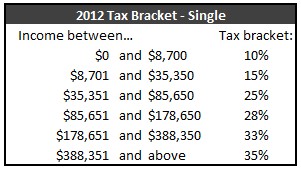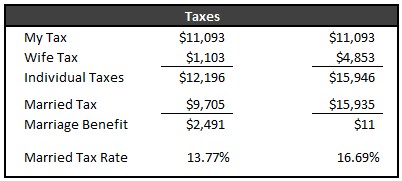I’m getting married next summer. As an accountant and someone who actively follows my personal finances, this means that I had to look up how saying ‘I do’ will impact my financial situation. Most specifically, how becoming married will affect my taxes paid.
First, in case you’re interested, here are the current applicable tax brackets (for me it’s individual (before marriage), or married filing jointly.


Now, we’ve all heard a lot about the “marriage penalty”. However, as part of the Tax Relief Act of 2010, Congress extended the marriage tax relief provisions that were originally enacted as part of the Economic Growth and Tax Relief Reconciliation Act. These provisions were extended through 2012. Essentially, Congress was able to get rid of the “marriage penalty” by doing the following:
- Extending the 15% income tax bracket for married couples to to cover higher income levels
- Increased the standard deduction for married couples to be double that of single filers
- Adjusted the Earned Income Tax Credit
Congress has currently extended these adjustments through 2012. As of now, they’re set to expire and the “marriage penalty” will return in 2013. If you’ve been paying attention to politics over the last few years, tax reform is one of the hot topics. If the tax system is restructured in a major way we can expect to see the marriage penalty done away with.
As someone who is getting married soon, I am interested in seeing the tax benefit that someone would receive by getting married versus staying single, under the current tax rates. For this calculation, I used my approximate 2012 income, and my fiance’s expected 2012 income. Here are the incomes I used. On the left is our 2012 income, and on the right is our expected income for next year (using 2012 rates).



So those are the income figured I used to calculate the following approximate tax rates…

As you can see in the column on the right, there’s currently not a marriage penalty. In the past, the marriage penalty hit what are often called DINKs (Dual Income, No Kids). It hurt most when each person was making the same amount. Even when calculating each at $70k income, there is currently no marriage penalty. However, beyond that, there still remains a marriage penalty. Remember above when I said that Congress had extended the 15% bracket? Well, because of this, as long as each person was going to be at the 25% bracket or under individually, and they remain in the 25% bracket or below when married, then there is not going to be a marriage penalty. However, married couples making a combined $142k+ are still penalized.
So if your incomes are approximately equal and you each make $70k or less, you’re going not going to be penalized. However, if you make a combined $142k or less, but one person in the couple makes significantly more than the other, then there will be a tax benefit. As you can see above, if one person makes $70k and the other $20k gross, there is an approximate $2.5k tax savings.
I’m glad to see the marriage penalty finally get addressed in some fashion, even if it’s temporary. It puts it even more in the spotlight, and hints toward eventual reform. I think the expiration of these provisions next year will put it even more in the spotlight because it will increase the tax burden for 30 million married couples by over $700 (estimated from Joint Committee on Taxation). I look forward to seeing what happens over the next year, and if we don’t see any significant overhaul to the tax system, I’d at least like to see these provisions extended. Even as an accountant, I believe that the current tax system is way too complicated. But that’s a discussion for another time.
While I am an accountant, I am not YOUR accountant. This post should not be construed as tax advice. Tax decisions are fact-dependent. Thus, you should seek the advice of your own CPA.



I’m just excited that EVERYONE’s standard deductions are going up this tax season.
Yup, an additional $150/person helps!
Will, great article. Being a married myself, I have felt the pain of the marriage tax penalty. However, there is another penalty that dwarfs the marriage tax penalty. The alternative minimum tax was originally established to address extremely high income earners. The big flaw is that income levels have not been adjusted for inflation. More and more people are getting hit with this ‘tax’. Congress need to act and adjust income levels so that it is used for the original purposes.